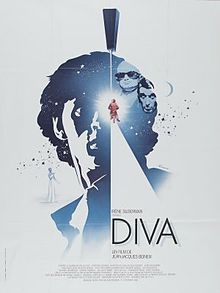- Diva (film)
-
Diva 
Directed by Jean-Jacques Beineix Produced by Claudie Ossard
Irène Silberman
Serge SilbermanWritten by Jean-Jacques Beineix
Jean Van Hamme
Based on the novel by DelacortaStarring Frédéric Andréi
Wilhelmenia Wiggins Fernandez
Richard BohringerMusic by Vladimir Cosma Cinematography Philippe Rousselot Editing by Monique Prim
Marie-Josèphe YoyotteDistributed by United Artists Release date(s) March 11, 1981 Running time 117 min (France)
123 min (United States)Country France Language French
EnglishBudget 7.5m FRF[citation needed] Box office $2,678,103 (USA)[1] Diva is a 1981 film directed by Jean-Jacques Beineix, adapted from a novel of the same name by Daniel Odier (under the pseudonym Delacorta). It is one of the first French films to let go of the realist, harsh mood of 1970s French cinema and return to a colourful, melodic style, called cinema du look. The film made a muted debut in France in 1981 with 2,281,569 admissions, but had success in the United States the next year grossing $2,678,103[2]. The film became a cult classic and was internationally acclaimed.
Contents
Plot
Jules, a young postman, is obsessed with Cynthia Hawkins, a beautiful and celebrated opera singer who has never consented to have her performances recorded. He attends her performance, secretly and illegally records it, and steals a gown from her dressing room.
Unknowingly, Jules also comes into possession of another important tape: the testimony of a prostitute, exposing Saporta, a high-ranking policeman, as the boss of various rackets. The prostitute drops the recording in the bag of the postman's moped moments before she is murdered.
In danger from Saporta's enforcers as well as from Taiwanese gangsters seeking the Hawkins tape, Jules seeks refuge with his new friends, the mysterious bohemian Serge Gorodish and his young muse Alba (the central figures of a series of novels, including the one upon which the screenplay was based). Gorodish acts as a deus ex machina to manipulate Jules's enemies into destroying each other. Meanwhile a romantic relationship between Jules and Cynthia develops, emphasised by the piano instrumental 'Promenade Sentimentale' of Vladimir Cosma as they walk around Paris early one morning.
Jules returns Hawkins' dress out of guilt after stealing it. Although she is initially angry, she then becomes amused and somewhat moved that she has such a fan. The two have breakfast together and Jules is given the privilege of hearing her practice her singing. Their relationship becomes somewhat strained however, when Hawkins hears that a perfect bootleg copy of her performance was made and sent to Taiwan, which insists that she either sign to make recordings of her performances or they will sell copies of the illegal tape. Jules believes that Gorodish and Alba sold the tape to the hitmen after him. He later learns that they still have the tape and that the call was a fake. At the end of the movie however, he plays the bootleg tape for Cynthia. She expresses slight nervousness over hearing it as she "never heard [herself] sing". Jules responds by holding her and the two dance together to the music.
Soundtrack
Highlights of the soundtrack include the aria Ebben? Ne andrò lontana from Alfredo Catalani's opera La Wally, and a pastiche of Erik Satie's Gnossiennes composed by Vladimir Cosma.
Cast
- Frédéric Andréi: Jules
- Wilhelmenia Wiggins Fernandez: Cynthia Hawkins
- Roland Bertin: Weinstadt
- Richard Bohringer: Gorodish
- Gérard Darmon: L' Antillais
- Chantal Deruaz: Nadia
- Jacques Fabbri: Jean Saporta
- Patrick Floersheim: Zatopek
- Thuy An Luu: Alba
- Dominique Pinon: Le Curé
Awards
- César Awards:
- Best Debut: Jean-Jacques Beineix
- Music: Vladimir Cosma
- Cinematography: Philippe Rousselot
- Sound: Jean-Pierre Ruh
References
External links
- Official website
- Diva at the Internet Movie Database
- Diva at AllRovi
- Diva at Rotten Tomatoes
Categories:- 1980s thriller films
- 1981 films
- Films directed by Jean-Jacques Beineix
- French thriller films
- Mystery films
- Opera films
- Psychological thriller films
Wikimedia Foundation. 2010.
